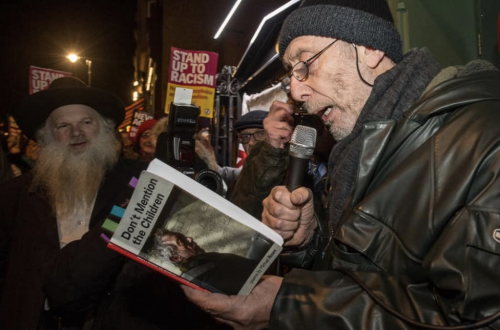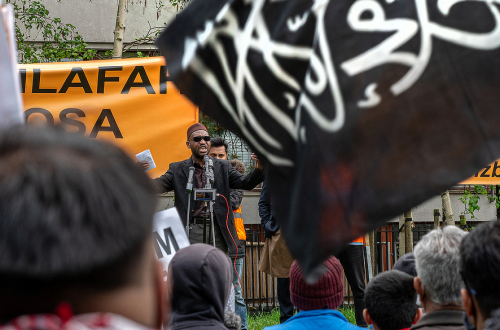This is a cross post by Joel Braunold from his blog and Ha’aretz
A few weeks ago, I spent Shabbat with a friend of mine in the Upper West Side of Manhattan. The shul he belongs to reminds me more of a yeshiva than the one I normally frequent but, nevertheless, I felt at home among the hats and coats. The rabbi’s speech was of particular interest. Toward the end, he commented on the Israeli election and ongoing coalition talks, warning that his community should be vigilant against those “who would attack the Torah way of life and give in to Arabs who want to destroy us.”
Saving the yeshivot has become synonymous with saving the settlements in the mind of many Orthodox Jews in the Diaspora. This has occurred due to the longstanding coalition partnerships between Likud and the rightwing and ultra-Orthodox parties. Their joint governments have traditionally been a one-stop shop for supporting a conservative social agenda as well as West Bank settlements.
But with the ultra-Orthodox parties cleaving from the political right in Israel’s incoming government, those who support both values find themselves at a crossroad.
The gloves came off when Shas declared it was willing to evacuate settlements, and Moshe Gafni, the ultra-Orthodox chair of the Knesset’s Finance Committee, revealed the true amount that the state has spent on settlements.
This new political environment forces a divide between those who support the conservative parties who have declared war on the settlement enterprise, like Shas, and those who support the alliance between national religious Habayit Hayehudi and centrist Yesh Atid, which aims to challenge the make up of Israel’s ultra-Orthodox community.
Particularly, this new political environment forces us to choose between whom we wish to support economically: the ultra-Orthodox, or the settlers.
Both sectors guzzle massive sums of Israeli tax funds, and while in an ideal world both issues would be addressed simultaneously, realistically, the Israeli government will probably have to start with one. If it were up to me, I would start with the settlements. Why?
There is no doubt that the ultra-Orthodox pose grave demographic challenges in Israel. According to The Metzilah Center, by 2028, 33 percentof Jewish children in Israel will be ultra-Orthodox and the ultra-Orthodox employment figures lag a good 40 percent behind the rest of the population, according to an OECD report. This situation needs to improve – and quickly.
Unlike the settlements, however, there are signs that the problem has been understood and steps have been taken to addresses it. Between 2009 and 2013, employment went up by 6 percent in the sector, and there has been a huge push through both state and philanthropic endeavors to get the ultra-Orthodox into the workplace.
Importantly, the global Diaspora has a vital role in helping integrate the ultra-Orthodox. Both the American and European Jewish communities have large ultra-Orthodox communities that work and are generally sustainable. There is a unique opportunity to learn the lessons of the global Jewish Diaspora and apply it to Israel. The solutions exist and there are many willing to help out on this problem.
Unlike the problems of the ultra-Orthodox, the settlement challenges are not trending in the right direction. While there are, of course, many issues that stand in the way of a final status agreement with the Palestinians, there are none as self destructive and wasteful as the continued subsidization of the settlements.
The economic and political costs are astronomical and create a long-term strategic threat to the very existence of Israel as a Jewish and democratic state. Habayit Hayehudi chairman Naftali Bennett represents a constituency that receives far more taxpayer support than his own neighbors in central Israel. Between 2011 and 2012, the cost of the settlements was, according to Peace Now, around NIS 2 billion, covering costs ranging from transportation to agriculture and housing.
Official channels of the Israeli government encourage the Diaspora to discuss Jewish challenges, including the problems that the country faces with its ultra-Orthodox community. They put settlements, however under the rubric of security, thereby deeming the topic “off limits” in the official Israel-Diaspora discourse. By doing so they restrict the Jewish world from helping in any way with the settlement problem, urging them instead not to ask questions.
By highlighting a populist issue such as the universal draft, the settler community has managed to morph themselves into the Israeli middle-class while demonstrating the clear “otherness” of the ultra-Orthodox population. By turning the ultra-Orthodox into hated figures, the Yesh Atid-Habayit Hayehudi alliance risks backsliding on the positive trends that the ultra-Orthodox community has made in the past few years, and masks the fact that the settlements are just as dependent on the state as those they attack.
Had he started by addressing the cost of the settlements, Lapid could have found more money for Israel’s middle classes, and helped the ultra-Orthodox integrate into society. Instead, he risks alienating a community he is trying to help while “koshering” a group that not only takes, but decimates Israel’s image in the world.
This election has demonstrated to overseas supporters of both the ultra-Orthodox and the settlers that Israel cannot square the circle at a time of fiscal tightening. Targeting the issues posed by the settlements offers us the best chance at dealing with both important public policy challenges successfully rather than through a populist push that will achieve neither.


